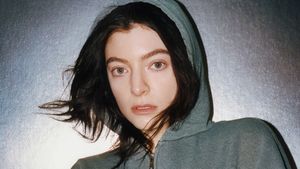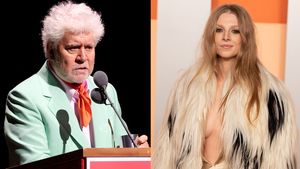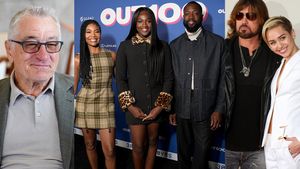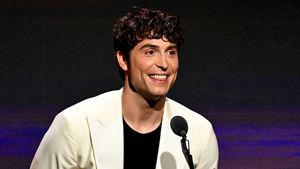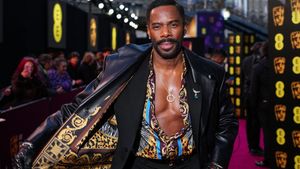The New York Times is facing backlash following an opinion piece about Taylor Swift and queer sexuality that some have deemed invasive, and with everyone chiming in, things are getting messy, fast. So what’s really going on?
Last Thursday, an op-ed penned by writer Anna Marks was published in The New York Times. Although it centered around Taylor Swift, and the longstanding speculation by fans surrounding queer-flagging in her music, her relationships with women thought to be more than just friends, and the rumor that she had intended to come out during the Lover era, the heart of the piece was about how modern society seems determined to prove we still aren’t ready to embrace LGBTQ+ celebrities in the same way as (perceived) straight celebrities.
She pointed to the obsession both the media and fans have with picking apart Swift’s love life—real, perceived, or completely fabricated—and how that’s okay, so long as it remains viewed through a heteronormative lens. She discussed the difference between celebrities coming out and average people coming out, the risks that are faced, the expectations of what “coming out” looks like, and how culture has historically and repeatedly forced Sapphic readings of art to be “ignored, censored, or lost to time.”
But all some people saw was speculation—hardly new—that Taylor Swift might not be straight. And that was a problem.
CNN Business(?) gets involved.

Shutterstock
Two days later, CNN Business put forth the claim that “Taylor Swift’s associates” were upset about the op-ed.
“Because of her massive success, in this moment there is a Taylor-shaped hole in people’s ethics,” the anonymous source said. “This article wouldn’t have been allowed to be written about Shawn Mendes or any male artist whose sexuality has been questioned by fans.
They added: “There seems to be no boundary some journalists won’t cross when writing about Taylor, regardless of how invasive, untrue, and inappropriate it is - all under the protective veil of an ‘opinion piece,’” while the article’s writer, Oliver Darcy, claimed Swift herself has refuted being part of the LGBTQ+ community. (In actuality, she once made a remark about realizing she could “advocate for a community [she’s] not a part of,” which is hardly the firm denial some want to think it is. Particularly so soon after Billie Eilish came out after explicitly saying she was straight several years earlier.)
This soon blew up, drawing more ire towards the original piece, despite several questionable aspects of the CNN article.
For one, although it’s common for sources close to a celebrity to speak to a publication about something, CNN Business is an unusual choice—which suggests an unusual source.
There was also notable pushback against the idea that nobody would speculate about a male celebrity’s sexuality, particularly when Marks herself previously wrote a similar piece about Harry Styles.
Chely Wright chimes in.

Shutterstock
Marks’ op-ed opened by discussing the struggles country music star Chely Wright had coming out as gay back in 2010.
Despite Wright’s wife, Lauren Blitzer, initially reposting the NYT op-ed, saying, “I’ll just leave this right here,” after the backlash began, Wright herself called the piece “triggering,” “not because the writer mentioned my nearly ending my life—but seeing a public person’s sexuality being discussed is upsetting.”
Having such exquisite firsthand experience with society’s unwillingness to move away from heteronormative expectations for public figures, Wright’s opinion is both valid and understandable.
What Taylor Swift herself has said.
Swift hasn’t responded to the controversy, which is to be expected, as she rarely comments on these matters directly.
Her publicist, Tree Paine, also has not appeared to comment, whether publicly or through the trades as an anonymous source—despite taking to Twitter to directly shut down “fabricated lies” about Swift from gossip account deuxmoi less than two months ago.
Where this leaves things.
Regardless of where Swift falls on the sexuality spectrum, two things are true.
First, the big uproar about Marks’ op-ed ultimately just proves her point. The fact that so many people have repeatedly felt the need to “defend” Swift against “allegations” of possibly being queer highlights what we all know—that coming out as LGBTQ+ is still seen as a strike against someone, something that can cause damage to their career.
This is something Marks’ piece hammered home again and again, while speculating both that it would take a massive celebrity like Swift coming out to move the needle in this way of thinking and that we keep proving she would not be embraced if she did.
“For [the majority of fans], acknowledging even the possibility that Ms. Swift could be queer would irrevocably alter the way they connect with her celebrity, the true product they’re consuming,” she wrote.
Secondly, it has repeatedly been people insisting that queer celebrities who have not explicitly come out of the closet publicly are straight, rather than those speculating they might be queer, that have forced them to come out. We’ve seen this with Kit Connor, Dove Cameron, and Rita Ora in the not-so-distant past, to name a few.
So is the NYT piece causing harm? Or is it CNN Business, Taylor’s “associates,” and everyone “defending” her—when she and her team have never appeared to feel queer rumors are something she needs defending against—who are causing a bigger problem?
Marks did not call for Swift to come out—nor do most of the fans who think she may be a part of the LGBTQ+ community. Instead, they simply reaffirm the idea that nobody has to come out with a big, explicit announcement the way straight people generally expect coming out to look like, and that both queer readings of art and queer-flagging have long been a part of queer culture. They are valid, and immeasurably important in a society that still is not as accepting as it could be. Demanding “straight until proven otherwise” is an attempt to diminish that and force people out before they are ready—and that is one of the points that is being completely lost on the people who are failing to look at the bigger picture laid out so thoughtfully right in front of them.
“The stories that dominate our collective imagination shape what our culture permits artists and their audiences to say and be,” Marks wrote. “Every time an artist signals queerness and that transmission falls on deaf ears, that signal dies. Recognizing the possibility of queerness — while being conscious of the difference between possibility and certainty — keeps that signal alive.”
From Your Site Articles
Related Articles Around the Web

















































































